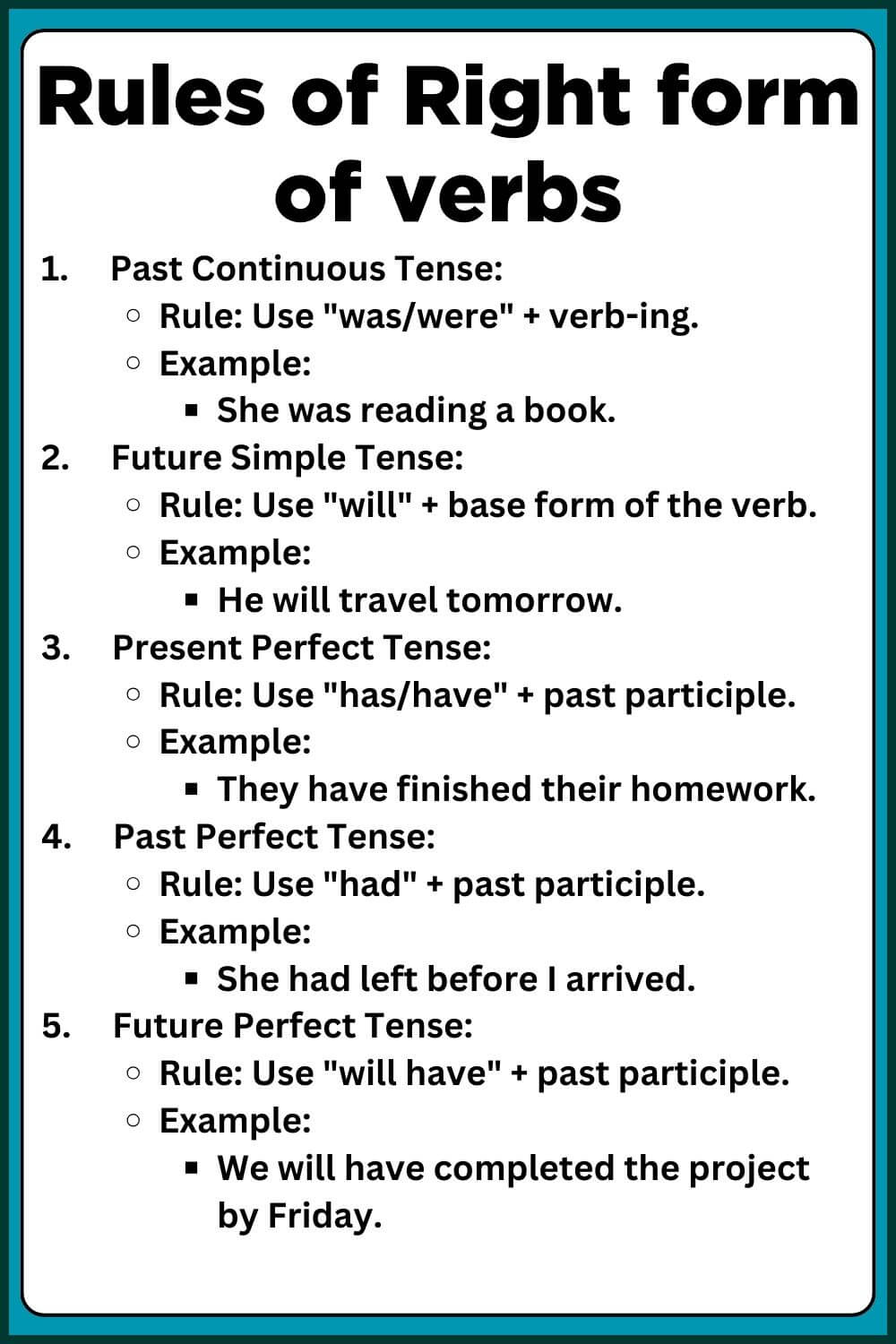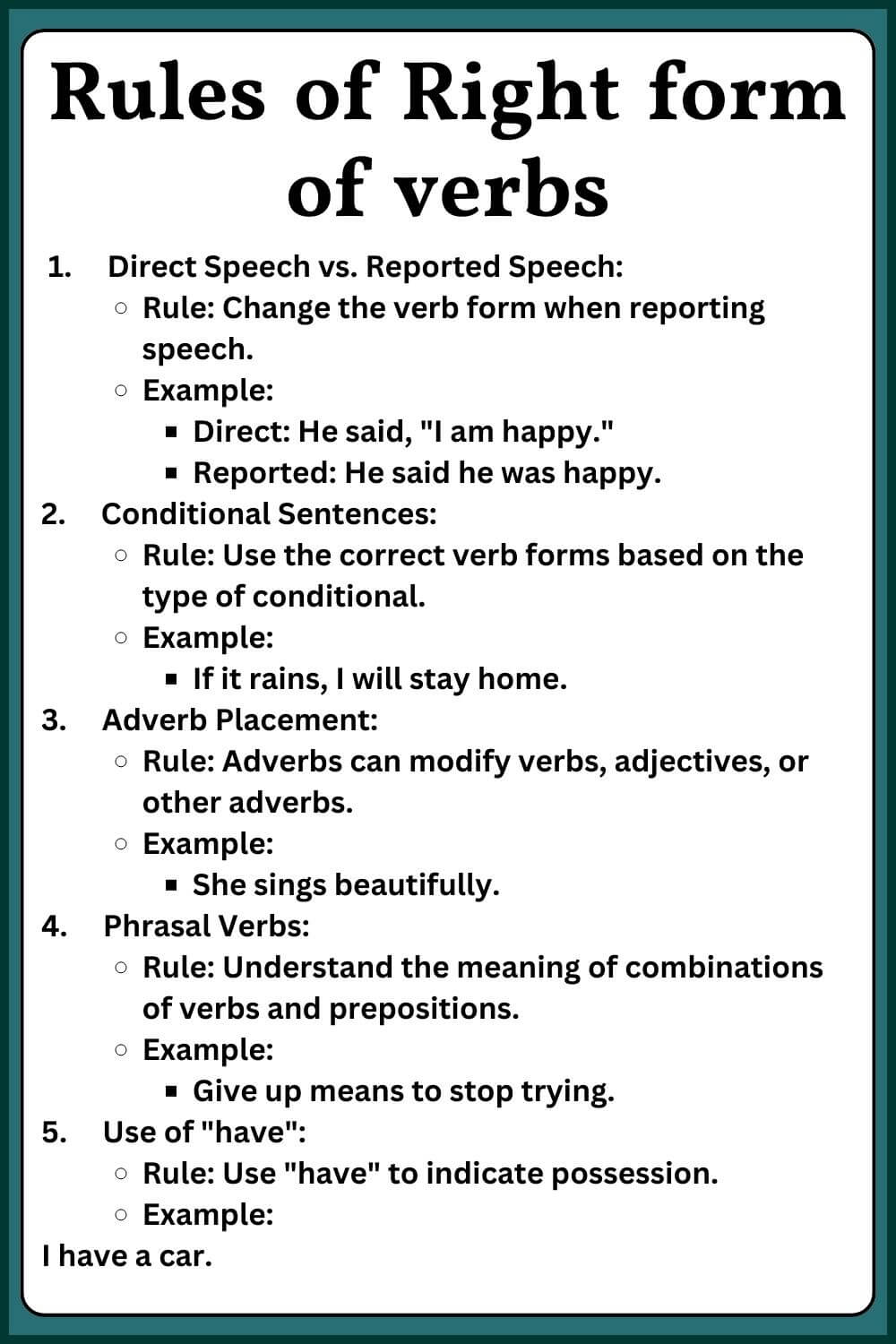Rules of Right form of verbs
Verbs are an essential part of the English language, serving as the action words that express what the subject of a sentence is doing. However, using the Right form of verbs can be challenging for many learners. Here we explain its importance, and provide rules and examples to help you master this critical aspect of English grammar.
What is the Right Form of Verbs?
The right form of verbs refers to the appropriate tense, aspect, and agreement of a verb used in a sentence. It ensures that the verb matches the subject in number and tense, allowing for clear and accurate communication. Understanding how to use the right verb forms is crucial for constructing correct and meaningful sentences in both spoken and written English.

50 Rules of the Right Form of Verbs with examples
Subject-Verb Agreement:
- Rule: A singular subject takes a singular verb, while a plural subject takes a plural verb.
- Example:
- Singular: The cat runs fast.
- Plural: The cats run fast.
Use of “to be”:
- Rule: Use the correct form of “to be” based on the subject and tense.
- Example:
- Present: I am, you are, he is.
- Past: I was, you were, he was.
- Rule: Use the base form of the verb for all subjects except for the third person singular (add -s or -es).
- Example:
- She plays soccer.
Simple Past Tense:
- Rule: Regular verbs add -ed, while irregular verbs have unique forms.
- Example:
- Regular: He walked to school.
- Irregular: They went to the store.
Present Continuous Tense:
- Rule: Use “am/is/are” + verb-ing.
- Example:
- They are eating lunch.
Past Continuous Tense:
- Rule: Use “was/were” + verb-ing.
- Example:
- She was reading a book.
Future Simple Tense:
- Rule: Use “will” + base form of the verb.
- Example:
- He will travel tomorrow.
Present Perfect Tense:
- Rule: Use “has/have” + past participle.
- Example:
- They have finished their homework.
Past Perfect Tense:
- Rule: Use “had” + past participle.
- Example:
- She had left before I arrived.
Future Perfect Tense:
- Rule: Use “will have” + past participle.
- Example:
- We will have completed the project by Friday.
Modals:
- Rule: Use modal verbs (can, could, may, might, must) with the base form of the verb.
- Example:
- You can call me later.
Imperative Form:
- Rule: Use the base form for commands or requests.
- Example:
- Please sit down.
Gerunds:
- Rule: Use the -ing form of the verb as a noun.
- Example:
- Swimming is fun.
- Infinitive Form:
- Rule: Use “to” + base form of the verb.
- Example:
- I want to learn English.
- Passive Voice:
- Rule: Use “to be” + past participle.
- Example:
- The cake was eaten by the children.
- Direct Speech vs. Reported Speech:
- Rule: Change the verb form when reporting speech.
- Example:
- Direct: He said, “I am happy.”
- Reported: He said he was happy.

- Conditional Sentences:
- Rule: Use the correct verb forms based on the type of conditional.
- Example:
- If it rains, I will stay home.
- Adverb Placement:
- Rule: Adverbs can modify verbs, adjectives, or other adverbs.
- Example:
- She sings beautifully.
- Phrasal Verbs:
- Rule: Understand the meaning of combinations of verbs and prepositions.
- Example:
- Give up means to stop trying.
- Use of “have”:
- Rule: Use “have” to indicate possession.
- Example:
- I have a car.
- Use of “to do”:
- Rule: Use “do/does” for negative sentences and questions in the present simple.
- Example:
- Do you like ice cream?
- Irregular Verbs:
- Rule: Memorize the irregular forms of common verbs.
- Example:
- Go → Went → Gone.
- Use of “should”:
- Rule: “Should” expresses advice or recommendation.
- Example:
- You should study for the exam.
- Use of “would”:
- Rule: “Would” is often used for polite requests.
- Example:
- I would like a cup of tea.
- Use of “might”:
- Rule: “Might” expresses possibility.
- Example:
- It might rain later.
- Singular Indefinite Pronouns:
- Rule: Indefinite pronouns like “everyone” take singular verbs.
- Example:
- Everyone is invited.
- Plural Indefinite Pronouns:
- Rule: Indefinite pronouns like “many” take plural verbs.
- Example:
- Many are coming to the party.
- Collective Nouns:
- Rule: Collective nouns can take singular or plural verbs depending on context.
- Example:
- The team is winning. (singular)
- The team are celebrating. (plural)
- Compound Subjects:
- Rule: Use a plural verb for compound subjects joined by “and.”
- Example:
- Jack and Jill are friends.
- Tenses in Time Clauses:
- Rule: Use the correct tense in the main and subordinate clauses.
- Example:
- When she arrives, we will eat.
- Use of “could”:
- Rule: “Could” indicates ability in the past.
- Example:
- I could swim when I was five.
- Use of “used to”:
- Rule: “Used to” expresses past habits.
- Example:
- I used to play soccer.
- Linking Verbs:
- Rule: Use linking verbs (like “be”) to connect subjects with their complements.
- Example:
- She is a teacher.
- Use of “seem” and “become”:
- Rule: These verbs describe a change in state.
- Example:
- He seems happy.
- Use of “look”:
- Rule: “Look” can indicate appearance.
- Example:
- You look tired.
- Causative Verbs:
- Rule: Use causative verbs (make, have, let) with the base form.
- Example:
- She made him cry.
- Verb + Preposition Combinations:
- Rule: Some verbs are always used with specific prepositions.
- Example:
- She depends on her friends.
- Subjunctive Mood:
- Rule: Use the base form of the verb in subjunctive situations.
- Example:
- I suggest that he be more careful.
- Infinitives after Certain Verbs:
- Rule: Some verbs are followed by infinitives.
- Example:
- She wants to go.
- Gerunds after Certain Verbs:
- Rule: Some verbs are followed by gerunds.
- Example:
- I enjoy swimming.
- Avoiding Double Negatives:
- Rule: Don’t use two negatives to express a single negative idea.
- Example:
- I don’t have any money (not: I don’t have no money).
- Adjective and Adverb Forms:
- Rule: Adjectives modify nouns; adverbs modify verbs, adjectives, or other adverbs.
- Example:
- She is quick (adjective) and runs quickly (adverb).
- Using “enough”:
- Rule: Place “enough” before nouns and after adjectives/adverbs.
- Example:
- She is smart enough to solve it.
- Avoiding Fragments:
- Rule: Ensure every sentence has at least a subject and a verb.
- Example:
- Correct: I enjoy reading.
- Incorrect: Enjoy reading.
- Using “neither” and “either”:
- Rule: “Neither” takes a singular verb; “either” can take a singular or plural verb.
- Example:
- Neither of them is here.
- Keeping Consistent Tenses:
- Rule: Maintain the same tense throughout a sentence.
- Example:
- He went to the store and bought milk.
- Using “since” and “for”:
- Rule: Use “since” for specific times and “for” for periods of time.
- Example:
- I’ve lived here since 2010.
- I’ve lived here for ten years.
- Recognizing Verb Forms in Questions:
- Rule: In questions, invert the subject and verb.
- Example:
- Are you coming?
- Using “to” in Infinitives:
- Rule: Use “to” before the base form of a verb for infinitives.
- Example:
- I want to eat pizza.
- Contractions:
- Rule: Contractions combine verbs with pronouns.
- Example:
- I’m (I am), she’s (she is).

Right form of verbs exercise
Fill-in-the-Blank Sentences
- She ______ (to be) happy today.
- They ______ (to play) soccer every Saturday.
- I ______ (to eat) breakfast at 8 a.m. yesterday.
- He ______ (to go) to the store tomorrow.
- We ______ (to read) books in the park.
- The dog ______ (to run) fast.
- She ______ (to swim) every summer.
- He ______ (to write) a letter last week.
- They ______ (to visit) their grandparents next month.
- The children ______ (to play) outside now.
- She ______ (to make) dinner last night.
- He ______ (to help) his sister with homework.
- I ______ (to see) a movie yesterday.
- They ______ (to enjoy) the concert last night.
- The team ______ (to win) the game last week.
- She ______ (to clean) her room every Sunday.
- He ______ (to drive) to work every day.
- We ______ (to finish) our project on time.
- She ______ (to teach) English to children.
- I ______ (to call) my friend later.
- They ______ (to visit) the museum last Saturday.
- He ______ (to play) the guitar beautifully.
- The cat ______ (to sleep) on the couch.
- I ______ (to want) to learn French.
- She ______ (to talk) to her friend right now.
- They ______ (to study) for the exam next week.
- We ______ (to walk) to the park every day.
- He ______ (to play) basketball with his friends.
- I ______ (to enjoy) reading books.
- She ______ (to write) in her journal every evening.
Answers for the fill-in-the-blank sentences
- She is happy today.
- They play soccer every Saturday.
- I ate breakfast at 8 a.m. yesterday.
- He will go to the store tomorrow.
- We are reading books in the park.
- The dog runs fast.
- She swims every summer.
- He wrote a letter last week.
- They will visit their grandparents next month.
- The children are playing outside now.
- She made dinner last night.
- He helped his sister with homework.
- I saw a movie yesterday.
- They enjoyed the concert last night.
- The team won the game last week.
- She cleans her room every Sunday.
- He drives to work every day.
- We finished our project on time.
- She teaches English to children.
- I will call my friend later.
- They visited the museum last Saturday.
- He plays the guitar beautifully.
- The cat sleeps on the couch.
- I want to learn French.
- She is talking to her friend right now.
- They are studying for the exam next week.
- We walk to the park every day.
- He plays basketball with his friends.
- I enjoy reading books.
- She writes in her journal every evening.

FAQ about Right Form of Verbs
Q1: Why is it important to use the right form of verbs? A: Using the right form of verbs is crucial for clear communication. It helps ensure that sentences are grammatically correct and convey the intended meaning.
Q2: How can I improve my understanding of verb forms? A: Practice is key! Regularly reading, writing, and speaking in English will help you become more familiar with verb forms. Additionally, studying grammar rules and doing exercises can be beneficial.
Q3: What are the most common verb tenses I should know? A: The most common verb tenses include the present simple, past simple, future simple, present continuous, and present perfect. Understanding these will cover most everyday situations.
Q4: Are there exceptions to the rules of verb forms? A: Yes, English has many irregular verbs and exceptions. It’s important to learn these exceptions as you practice.
Q5: Can I use online resources to learn more about verb forms? A: Absolutely! There are many online resources, including grammar websites, videos, and interactive exercises that can help you understand verb forms better.

